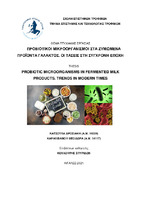| dc.contributor.advisor | Κουλούρης, Σπυρίδων | |
| dc.contributor.author | Κατσούλα, Δροσιανή | |
| dc.contributor.author | Καραλίβανου, Θεοδώρα | |
| dc.date.accessioned | 2021-03-22T13:20:22Z | |
| dc.date.available | 2021-03-22T13:20:22Z | |
| dc.date.issued | 2021-03-04 | |
| dc.identifier.uri | https://polynoe.lib.uniwa.gr/xmlui/handle/11400/465 | |
| dc.identifier.uri | http://dx.doi.org/10.26265/polynoe-316 | |
| dc.description.abstract | Θέμα της παρούσας πτυχιακής εργασίας είναι οι προβιοτικοί μικροοργανισμοί που βρίσκονται στα ζυμώμενα προϊόντα γάλακτος και οι σύγχρονες τάσεις που αφορούν τα προϊόντα αυτά. Τα πιο γνωστά τρόφιμα που παράγονται από τη ζύμωση του γάλακτος είναι το τυρί, το γιαούρτι, το βούτυρο, το κεφίρ, το κουμίς, το ξυνόγαλα και το dahi. Οι σημαντικότεροι προβιοτικοί οργανισμοί που συμμετέχουν στην παραγωγή τους είναι στελέχη βακτηρίων των οικογενειών Lactobacillus, Lactococcus, Streptococcus, Enterococcus, Pediococcus, Bifidobacterium και Propionibacterium, καθώς και ζύμες. Τα προβιοτικά τρόφιμα παρέχουν σημαντικά οφέλη στην υγεία του καταναλωτή. Ενδεικτικά αναφέρεται ότι θεωρείται ότι βοηθούν στη διατήρηση της μικροχλωρίδας του εντέρου και στην προστασία από τα γαστρεντερικά παθογόνα, ενισχύουν το ανοσοποιητικό σύστημα, διευκολύνουν τη πέψη, έχουν αντικαρκινική δράση. Σύμφωνα με τα σύγχρονα πρότυπα υγείας και διατροφής, η ζήτηση των λειτουργικών τροφίμων τις τελευταίες δεκαετίες έχει αυξηθεί σημαντικά. Το 60-70% της αγορά τους καταλαμβάνεται από τα προβιοτικά τρόφιμα. Υπάρχει η τάση, πολλά γαλακτομικά προϊόντα που παραδοσιακά δεν ανήκαν σε αυτή την κατηγορία, να ενισχυθούν με την προσθήκη προβιοτικών βακτηρίων, όπως παγωτό ή σκόνη γάλακτος. Επίσης, γίνονται προσπάθειες ώστε τα προβιοτικά να λειτουργήσουν ως υποκατάστατα ορισμένων φαρμάκων, ακόμη και αντιβιοτικών. Με τη βοήθεια της Γενετικής Μηχανικής ενισχύονται ορισμένα λειτουργικά χαρακτηριστικά τους και με τη χρήση νέων τεχνικών όπως της ενθυλάκωσης, βελτιώνεται η βιωσιμότητα τους. | el |
| dc.format.extent | 81 | el |
| dc.publisher | Πανεπιστήμιο Δυτικής Αττικής | el |
| dc.rights | Αναφορά Δημιουργού - Μη Εμπορική Χρήση - Παρόμοια Διανομή 4.0 Διεθνές | * |
| dc.rights | Αναφορά Δημιουργού 4.0 Διεθνές | * |
| dc.rights.uri | http://creativecommons.org/licenses/by/4.0/ | * |
| dc.subject | Προβιοτικά | el |
| dc.subject | Ζυμώμενα γαλακτοκομικά προίοντα | el |
| dc.subject | Πρεβιοτικά | el |
| dc.subject | Συμβιωτικά | el |
| dc.subject | Παραβιοτικά | el |
| dc.subject | Μεταβιοτικά | el |
| dc.subject | Ψυχοβιοτικά | el |
| dc.subject | Μικροενθυλάκωση | el |
| dc.subject | Προβιοτικά ως αντιβιοτικά | el |
| dc.title | Προβιοτικοί μικροοργανισμοί στα ζυμώμενα προιόντα γάλακτος. Οι τάσεις στη σύγχρονη εποχή. | el |
| dc.title.alternative | Probiotics microorganisms in fermented milk products. Trends in modern times. | el |
| dc.type | Πτυχιακή εργασία | el |
| dc.contributor.committee | Τριάντη, Μυρτώ | |
| dc.contributor.committee | Κουλούρης, Σπυρίδων | |
| dc.contributor.committee | Tsakali, Efstathia | |
| dc.contributor.faculty | Σχολή Επιστημών Τροφίμων | el |
| dc.contributor.department | Τμήμα Επιστήμης και Τεχνολογίας Τροφίμων | el |
| dc.description.abstracttranslated | The subject of this thesis is the probiotic microorganisms in fermented milk products and the modern trends about them. The most well-known foods produced by fermenting milk are cheese, yogurt, butter, kefir, koumis, sour milk and dahi. The most important probiotic organisms are bacterial strains of the families Lactobacillus, Lactococcus, Streptococcus, Enterococcus, Pediococcus, Bifidobacterium and Propionibacterium, as well as yeasts. Probiotic foods provide significant health benefits to the consumer. Indicatively, it is mentioned that they are considered to help maintain the intestinal microflora and to protect against gastrointestinal pathogens, strengthen the immune system, to facilitate digestion, to have anti-cancer action. According to modern health and nutrition standards, the demand for functional food has increased significantly in recent decades. 60-70% of their market is occupied by probiotic foods. There is a tendency for many dairy products that traditionally did not belong to this category to be enhanced by the addition of probiotic bacteria, such as ice cream or milk powder. Efforts are also being made to make probiotics act as substitutes for certain drugs, even antibiotics. With the help of Genetic Engineering, some of their functional characteristics are enhanced and with the use of new techniques such as encapsulation, their viability is improved. | el |




